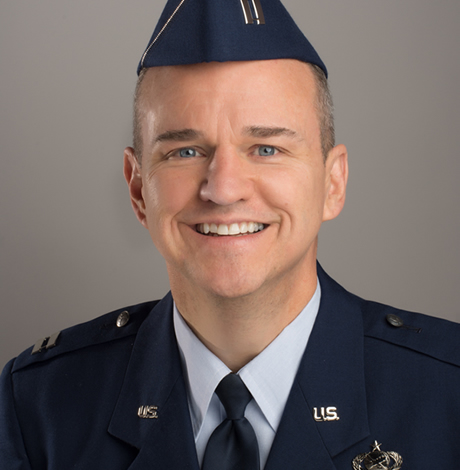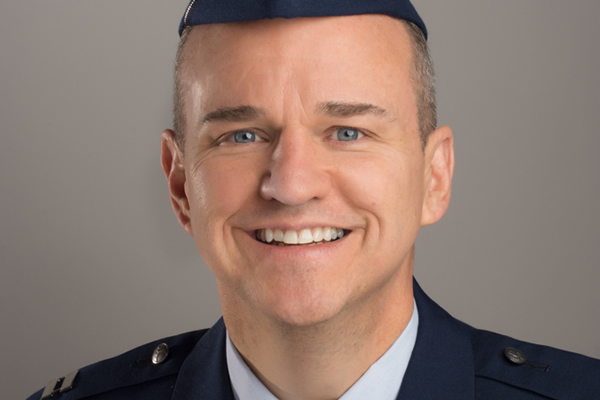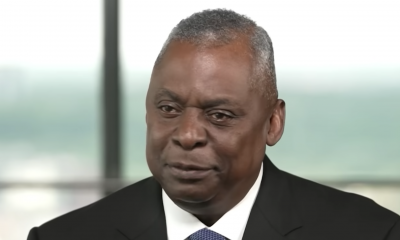Books
Retired Air Force captain recalls closeted career in new memoir
‘Served in Silence’ author hopes autobiography will illuminate closet’s toll


Mark David Gibson is releasing his memoir this weekend. The retired U.S. Air Force captain says a career spent in the closet took unexpected tolls. (Photo courtesy Gibson)
Retired U.S. Air Force Captain Mark David Gibson releases his memoir “Served in Silence” this weekend looking at his personal journey before, during, and after the military’s Don’t Ask, Don’t Tell” (DADT) policy.
Gibson says he knew it was the right time to tell his story when he finally overcame the obstacles and hazards of living a life that was not authentic. A launch party is planned for Saturday, March 31 in Atlanta.
“I had won the battle over PTSD, alcoholism and found my way out of the darkness of shame and secrecy,” he says. “I intended on my memoir being able to help others identify the hazards of not living authentically and using my book as a roadmap to avoid these hazards. I wanted the book to build a bridge to other projects focusing on developing authentic lifestyles.”
A small-town boy from upstate New York, Gibson entered the military because he didn’t see a lot of options after high school. He was bullied in school and accelerated his education to graduate at 16 and join the Air Force at 17. He remembers clearly the recruiting sergeant placing a special emphasis on the last item of the enlistment documents that specifically stated homosexuals were not permitted.
“Looking back now that might as well have been the grim reaper stealing my soul,” Gibson says. “It did strike me as odd that while agreeing to sacrifice civilian freedoms that the end of the document was about sex or sexuality. When President Clinton signed the DADT policy into law, I felt a sense of hope that quickly diminished to false hope. I had no idea how dehumanizing the policy actually was and how it would push me further into the shadows of shame and secrecy.”
As within life, Gibson believes there were some who suspected, but that was the problem.
“I don’t believe anyone wakes up and enters the day to have others be suspicious of them as if they were less than, wrong or dirty,” he says. “From a professional point of view, I simply could not imagine ever a time it would be acceptable to discuss sex or sexuality in uniform. They were not asking and I was not telling. I seldom lived in the same community where I was stationed and, at a great peril, would drive long distances to escape to a somewhat normal life. Ironically, at home it was the reverse, where I rarely shared details about my military work life with my gay friends or partners.”
Writing the book, he found, was not easy. He had a collection of sticky notes, bar napkins and rough drafts that he had collected through the years, but it was not until Gibson was accepted into the Publish Your Purpose Author’s Academy in May, 2017 that started to turn things around for him and this project.
“The goal of the 14-week academy is not to teach you how to write, but it teaches you all of the steps and process in publishing your works when you’re done,” he says. “After about the first couple of weeks, I woke up at 3 a.m. and had a clear vision that I would commit to finishing my manuscript. I have found in my life that when I am committed to something, nothing will get in the way, and I did in fact finish both, and in fall of 2017 we went right into the publishing process.”
The book, he says, was a good exercise to reconstruct the past and identify and pin point when the hazards occurred with his struggle to live authentically.
“The filters I laid over my life and personality over a lifetime pushed me into the shadows to believe I was less-than and never good enough to bring my true self to the day,” Gibson says. “The most challenging part of the DADT policy was the fact that my team never got to experience me as a whole person. As a highly decorated officer, I can only imagine the other greatness I could have achieved if I were allowed to bring my full 100 percent authentic self to the day.”
Gibson dedicated his book to his fellow military members who “served in silence,” and those who struggle the way he once did.
“My hope is that people can learn from the hazards of living in the shadows of darkness as ‘less-than’ and see how productive and unimaginable joy comes from a life lived authentically,” he says. “Regardless of your situation, if you are blocked from living authentically, you block your potential in both your personal and professional life. I hope our country can learn from DADT and continue a path of inclusion for all citizens who want to serve their country proudly and openly.”
Books
Embracing the chaos can be part of the fun
‘Make Sure You Die Screaming’ offers many twists and turns

‘Make Sure You Die Screaming’
By Zee Carlstrom
c.2025, Random House
$28/304 pages
Sometimes, you just want to shut the door and forget what’s on the other side.
You could just wipe it from your memory, like it didn’t occur. Or create an alternate universe where bad things never happen to you and where, as in the new novel “Make Sure You Die Screaming” by Zee Carlstrom, you can pretend not to care.

Their mother called them “Holden,” but they’d stopped using that name and they hadn’t decided what to use now. What do you call an alcoholic, queer, pessimistic former ad executive who’s also “The World’s First Honest White Man,” although they no longer identify as a man? It’s a conundrum that they’ll have to figure out soon because a cop’s been following them almost since they left Chicago with Yivi, their psychic new best friend.
Until yesterday, they’d been sleeping on a futon in some lady’s basement, drinking whatever Yivi mixed, and trying not to think about Jenny. They killed Jenny, they’re sure of it. And that’s one reason why it’s prudent to freak out about the cop.
The other reason is that the car they’re driving was stolen from their ex-boyfriend who probably doesn’t know it’s gone yet.
This road trip wasn’t exactly well-planned. Their mother called, saying they were needed in Arkansas to find their father, who’d gone missing so, against their better judgment, they packed as much alcohol as Yivi could find and headed south. Their dad had always been unique, a cruel man, abusive, intractable; he suffered from PTSD, and probably another half-dozen acronyms, the doctors were never sure. They didn’t want to find him, but their mother called…
It was probably for the best; Yivi claimed that a drug dealer was chasing her, and leaving Chicago seemed like a good thing.
They wanted a drink more than anything. Except maybe not more than they wanted to escape thoughts of their old life, of Jenny and her death. And the more miles that passed, the closer they came to the end of the road.
If you think there’s a real possibility that “Make Sure You Die Screaming” might run off the rails a time or three, you’re right. It’s really out there, but not always in a bad way. Reading it, in fact, is like squatting down in a wet, stinky alley just after the trash collector has come: it’s filthy, dank, and profanity-filled. Then again, it’s also absurd and dark and philosophical, highly enjoyable but also satisfying and a little disturbing; Palahniuk-like but less metaphoric.
That’s a stew that works and author Zee Carlstrom stirs it well, with characters who are sardonic and witty while fighting the feeling that they’re unredeemable losers – which they’re not, and that becomes obvious.
You’ll see that all the way to one of the weirdest endings ever.
Readers who can withstand this book’s utter confusion by remembering that chaos is half the point will enjoy taking the road trip inside “Make Sure You Die Screaming.”
Just buckle up tight. Then shut the door, and read.
The Blade may receive commissions from qualifying purchases made via this post.
Books
Two new books on dining out LGBTQ-style
Visit nightclubs, hamburger joints, and a bathhouse that feeds customers

‘What is Queer Food? How We Served a Revolution’
By John Birdsall
c.2025, W.W. Norton
$29.99/304 pages
‘Dining Out: First Dates, Defiant Nights, and Last Call Disco Fries at America’s Gay Restaurants’
By Erik Piepenburg
c.2025, Grand Central
$30/352 pages
You thought a long time about who sits where.
Compatibility is key for a good dinner party, so place cards were the first consideration; you have at least one left-hander on your guest list, and you figured his comfort into your seating chart. You want the conversation to flow, which is music to your ears. And you did a good job but, as you’ll see with these two great books on dining LGBTQ-style, it’s sometimes not who sits where, but whose recipes were used.
When you first pick up “What is Queer Food?” by John Birdsall, you might miss the subtitle: “How We Served a Revolution.” It’s that second part that’s important.

Starting with a basic gay and lesbian history of America, Birdsall shows how influential and (in)famous 20th century queer folk set aside the cruelty and discrimination they received, in order to live their lives. They couldn’t speak about those things, he says, but they “sat down together” and they ate.
That suggested “a queer common purpose,” says Birdsall. “This is how who we are, dahling, This is how we feed our own. This is how we stay alive.”
Readers who love to cook, bake or entertain, collect cookbooks, or use a fork will want this book. Its stories are nicely served, they’re addicting, and they may send you in search of cookbooks you didn’t know existed.
Sometimes, though, you don’t want to be stuck in the kitchen, you want someone else to bring the grub. “Dining Out” by Erik Piepenburg is an often-nostalgic, lively look at LGBTQ-friendly places to grab a meal – both now and in the past.

In his introduction, Piepenburg admits that he’s a journalist, “not a historian or an academic,” which colors this book, but not negatively. Indeed, his journeys to “gay restaurants” – even his generous and wide-ranging definitions of the term – happily influence how he presents his narrative about eateries and other establishments that have fed protesters, nourished budding romances, and offered audacious inclusion.
Here, there are modern tales of drag lunches and lesbian-friendly automats that offered “cheap food” nearly a century ago. You’ll visit nightclubs, hamburger joints, and a bathhouse that feeds customers on holidays. Stepping back, you’ll read about AIDS activism at gay-friendly establishments, and mostly gay neighborhood watering holes. Go underground at a basement bar; keep tripping and meet proprietors, managers, customers and performers. Then take a peek into the future, as Piepenburg sees it.
The locales profiled in “Dining Out” may surprise you because of where they can be found; some of the hot-spots practically beg for a road trip.
After reading this book, you’ll feel welcome at any of them.
If these books don’t shed enough light on queer food, then head to your favorite bookstore or library and ask for help finding more. The booksellers and librarians there will put cookbooks and history books directly in your hands, and they’ll help you find more on the history and culture of the food you eat. Grab them and you’ll agree, they’re pretty tasty reads.
The Blade may receive commissions from qualifying purchases made via this post.

You’re going to be on your feet a lot this month.
Marching in parades, dancing in the streets, standing up for people in your community. But you’re also likely to have some time to rest and reflect – and with these great new books, to read.
First, dip into a biography with “Marsha: The Joy and Defiance of Marsha P. Johnson” by Tourmaline (Tiny Rep Books, $30), a nice look at an icon who, rumor has it, threw the brick that started a revolution. It’s a lively tale about Marsha P. Johnson, her life, her activism before Stonewall and afterward. Reading this interesting and highly researched history is a great way to spend some time during Pride month.
For the reader who can’t live without music, try “The Dad Rock That Made Me a Woman” by Niko Stratis (University of Texas Press, $27.95), the story of being trans, searching for your place in the world, and finding it in a certain comfortable genre of music. Also look for “The Lonely Veteran’s Guide to Companionship” by Bronson Lemer (University of Wisconsin Press, $19.95), a collection of essays that make up a memoir of this and that, of being queer, basic training, teaching overseas, influential books, and life.
If you still have room for one more memoir, try “Walk Like a Girl” by Prabal Gurung (Viking, $32.00). It’s the story of one queer boy’s childhood in India and Nepal, and the intolerance he experienced as a child, which caused him to dream of New York and the life he imagined there. As you can imagine, dreams and reality collided but nonetheless, Gurung stayed, persevered, and eventually became an award-winning fashion designer, highly sought by fashion icons and lovers of haute couture. This is an inspiring tale that you shouldn’t miss.
No Pride celebration is complete without a history book or two.
In “Trans History: From Ancient Times to the Present Day” by Alex L. Combs & Andrew Eakett ($24.99, Candlewick Press), you’ll see that being trans is something that’s as old as humanity. One nice part about this book: it’s in graphic novel form, so it’s lighter to read but still informative. Lastly, try “So Many Stars: An Oral History of Trans, Nonbinary, Genderqueer, and Two-Spirit People of Color” by Caro De Robertis (Algonquin Books of Chapel Hill. $32.00) a collection of thoughts, observations, and truths from over a dozen people who share their stories. As an “oral history,” you’ll be glad to know that each page is full of mini-segments you can dip into anywhere, read from cover to cover, double-back and read again. It’s that kind of book.
And if these six books aren’t enough, if they don’t quite fit what you crave now, be sure to ask your favorite bookseller or librarian for help. There are literally tens of thousands of books that are perfect for Pride month and beyond. They’ll be able to determine what you’re looking for, and they’ll put it directly in your hands. So stand up. March. And then sit and read.




















